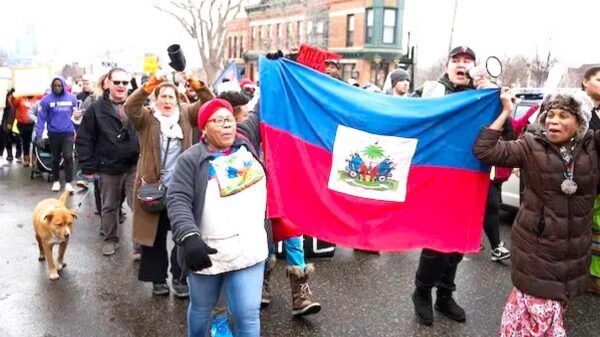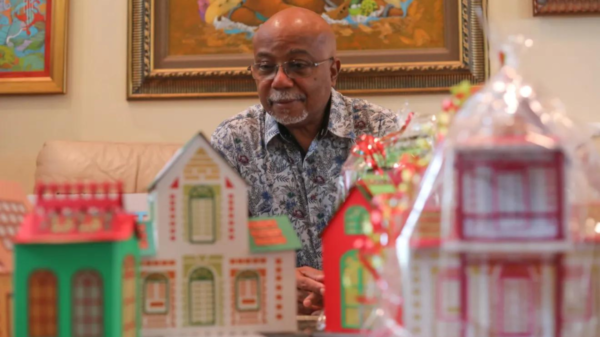By Onz Chery

CAP-HAITIEN — David Saint-Juste’s voice started shrieking through the phone as if he was about to cry, but somehow he managed to collect himself. The problems in Bel Air, a rundown neighborhood in Port-au-Prince, are just too much to bear.
Children often spend three days without a proper meal, and one of them has been complaining about getting dizzy. About every two weeks, people are shot dead in the neighborhood. Many residents are still homeless after gang members burned their homes. They are so helpless that some have gone to the point that they collect rainwater to take care of their basic needs, Saint-Juste said.
Saint-Juste spoke to The Haitian Times on the eve of May 2022, a month known for two patriotic holidays: Labor and Agriculture Day and Flag Day. Depressed, celebrating those holidays in any shape or form was nowhere near Saint-Juste’s mind.
“Bel Air hit rock bottom,” Saint-Juste, who preferred to be referred to as this pseudonym out of fear of getting attacked, said. “Some parts look like the Amazon forest now, only the animals are missing. Can we celebrate in this condition?”
It has become a pattern over the years for many Haitians, particularly in Port-au-Prince, to neglect national holidays because they are suffering from gang violence, high cost of living, hunger, and other effects of prolonged political instability.
Although there are still some festivities planned across the country, the center of celebration for Haiti’s May festivities has shifted overseas, notably in Florida and New York. May is Haitian Heritage Month in the United States and as per usual the month is filled with different events like brunches, art exhibitions, dance classes, and more.
So, the sense of patriotism is considerably higher among some Haitian-Americans because they are not exposed to Haiti’s struggles, residents said.
“If you go try telling a child in Haiti ‘You have to be proud of your country.’ He will look at you like ‘What are you talking about?” said Fayola Nicaisse, a Miami-based entrepreneur. “Every time I talk to families in Haiti they’re in chaos. How can they be excited?”
Meanwhile, for many Haitians overseas since they are not blinded firsthand by the country’s struggles, they can fully advocate and cherish the Haitian pride, the country’s culture and history.
“We’re holding the flag up high for them,” said Mecca “Grimo” Marcelin, a cultural promoter in Miami. “They may not understand because they’re going through dire situations right now, us on this side, this is our obligation.”
From celebrating to counting deaths
Bel Air, Saint-Juste’s native neighborhood, was once known for producing arts and was also a center of attraction on Flag Day, but there have not been parades there in three years. Many residents there, around this time of year, are in survival mode. Saint-Juste is looking for ways to collect money to assist four families who struggle to eat. The thoughts of May celebrations are only distant memories now.
“When someone cut a tree they told people to encourage them to plant 10,” Saint-Juste said, referring to the past Agriculture Day festivities. “Now we’re counting by tens people we lost.”
Just last year, three days before May 18, gang members killed at least three Bel Air residents, injured many others and burned homes.
This year, gangs are targeting Croix-des-Bouquets, a commune near Port-au-Prince, in May. Many residents have been fleeing their homes due to gang violence. Croix-des-Bouquets was once known for its rara bands, but has lost its patriotic flair to being known for kidnapping and gang shootings.
Champ de Mars, Port-au-Prince’s main square, was also known for hosting May festivities but is now a go-to spot for violent protests.
More patriotic after leaving Haiti
Even in Cap-Haitien, Haiti’s second-largest city which is not plagued by gang violence, residents are lamenting the lack of celebration. However, there was a food fair for Agriculture Day and there will be parades on Flag Day, but it is not what it used to be, residents said.
“May 18, the birth of our flag, is still what it is but we [Haitians] changed,” said Womario Louis, 23, a Cap-Haitien resident. “And that will always hurt. People in other countries are doing a lot of activities. There’s something about Haitians, they love their country more when they’re outside of it.”
Indeed, Marcelin, the cultural promoter, said it is partially true that some Haitian overseas see the value of Haiti after leaving it.
But for Valery Marius, a Haitian-born entrepreneur based in Pembroke Pines, Florida, his love for Haiti will remain the same no matter what country he is in, he said. Marius also strongly disagrees that Haitians overseas are more patriotic than those in Haiti.
“They still feel like those days [holidays] will always be important,” the president of Valmas Cremas said. “Here, it seems like it’s bigger in appearance because they designated a month for it, so it’s making more impact.”
To those arguing that the patriotic mood did drop in Haiti, the solution to fix this issue is to fix the country.
“The people here to give the country directions have to do their duty,” said Nicaisse, owner of Ebene Naturals, a beauty product brand. “The world is watching us.”









You must be logged in to post a comment Login